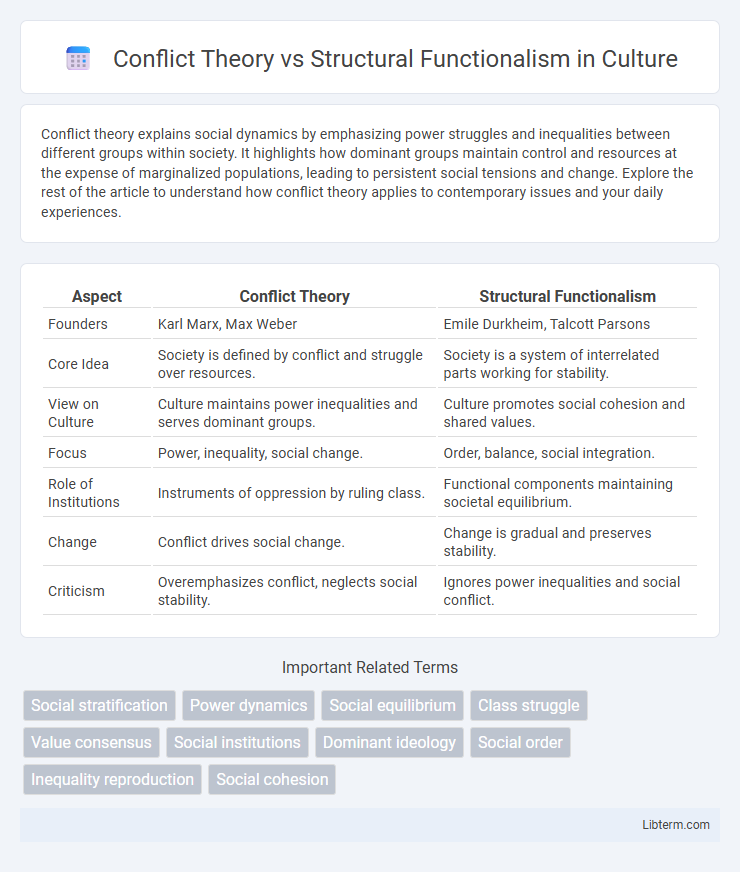Conflict theory explains social dynamics by emphasizing power struggles and inequalities between different groups within society. It highlights how dominant groups maintain control and resources at the expense of marginalized populations, leading to persistent social tensions and change. Explore the rest of the article to understand how conflict theory applies to contemporary issues and your daily experiences.
Table of Comparison
| Aspect | Conflict Theory | Structural Functionalism |
|---|---|---|
| Founders | Karl Marx, Max Weber | Emile Durkheim, Talcott Parsons |
| Core Idea | Society is defined by conflict and struggle over resources. | Society is a system of interrelated parts working for stability. |
| View on Culture | Culture maintains power inequalities and serves dominant groups. | Culture promotes social cohesion and shared values. |
| Focus | Power, inequality, social change. | Order, balance, social integration. |
| Role of Institutions | Instruments of oppression by ruling class. | Functional components maintaining societal equilibrium. |
| Change | Conflict drives social change. | Change is gradual and preserves stability. |
| Criticism | Overemphasizes conflict, neglects social stability. | Ignores power inequalities and social conflict. |
Introduction to Conflict Theory and Structural Functionalism
Conflict Theory emphasizes power disparities and social inequality as drivers of societal change, highlighting the struggles between dominant and subordinate groups. Structural Functionalism views society as an interconnected system where each institution contributes to stability and social order by fulfilling essential functions. Both perspectives offer contrasting frameworks for analyzing social structures and dynamics within communities.
Historical Background and Origins
Conflict Theory emerged in the mid-19th century, largely influenced by Karl Marx's critique of capitalism and class struggles during the Industrial Revolution. Structural Functionalism developed in the early 20th century, rooted in the works of Emile Durkheim, who emphasized social order, stability, and the interdependence of societal institutions. Both theories reflect distinct responses to the social changes and challenges posed by modernization and industrialization in Western societies.
Key Theorists and Foundational Texts
Conflict Theory, primarily developed by Karl Marx and expanded by theorists like Max Weber and C. Wright Mills, centers on social inequality and power struggles described in Marx's foundational text "The Communist Manifesto" and Weber's "Economy and Society." Structural Functionalism, advanced by Emile Durkheim and Talcott Parsons, emphasizes societal stability and cohesion, with Durkheim's "The Division of Labour in Society" and Parsons' "The Social System" as key works shaping the perspective. These foundational texts and thinkers provide contrasting views on how societies function through conflict versus consensus.
Core Principles of Conflict Theory
Conflict Theory centers on the idea that society is characterized by ongoing struggles between groups competing for limited resources, emphasizing power differentials and social inequalities. It highlights how dominant groups maintain control and privilege through institutions, creating systemic oppression of marginalized populations. The theory critiques social structures that perpetuate economic disparities, class conflicts, and social injustices, contrasting with Structural Functionalism's focus on social order and stability.
Main Tenets of Structural Functionalism
Structural Functionalism emphasizes society as a complex system whose parts work together to promote stability, order, and social cohesion. It asserts that each social institution, such as family, education, and government, serves specific functions that contribute to the overall functioning and equilibrium of society. Key concepts include social norms, roles, and institutions working in harmony to maintain societal balance and prevent dysfunction.
Differences in Perspectives on Society
Conflict Theory views society as a dynamic arena of inequality where power struggles and resource competition drive social change. Structural Functionalism sees society as a complex system of interdependent parts working together to maintain stability and social order. While Conflict Theory emphasizes conflict and revolution, Structural Functionalism highlights consensus and cooperation among social institutions.
Analysis of Social Institutions
Conflict Theory analyzes social institutions by emphasizing power disparities and resource inequalities, arguing that institutions perpetuate dominance of privileged groups over marginalized ones. Structural Functionalism views social institutions as essential components that maintain social order, stability, and consensus by fulfilling crucial societal functions. The contrasting perspectives provide insights into the roles institutions play either in preserving inequality or in promoting cohesion within society.
Strengths and Criticisms of Conflict Theory
Conflict Theory offers a powerful framework for understanding social inequality by emphasizing power differentials and class struggles as drivers of change. Its strength lies in highlighting systemic oppression and exposing how dominant groups maintain control through economic and political means. However, critics argue that Conflict Theory tends to overlook social stability and consensus, often portraying society as overly antagonistic and neglecting the complexity of cooperation and shared values.
Strengths and Criticisms of Structural Functionalism
Structural functionalism offers a comprehensive framework for understanding social stability and the interdependence of institutions, highlighting how societal components contribute to overall functioning. Its strength lies in explaining social order and cohesion through roles and norms, yet it faces criticism for overlooking social inequalities, power dynamics, and the potential for social change. Critics argue structural functionalism tends to justify the status quo and underestimates conflict and diversity within societies.
Contemporary Relevance and Applications
Conflict Theory highlights power disparities and social inequalities shaping institutions, essential for analyzing systemic racism, economic disparities, and political struggles in modern societies. Structural Functionalism emphasizes social cohesion and stability, informing public policies for health, education, and welfare systems to maintain societal equilibrium. Both frameworks guide sociological research and policymaking, addressing challenges from globalization, technological change, and social justice movements.
Conflict Theory Infographic

 libterm.com
libterm.com